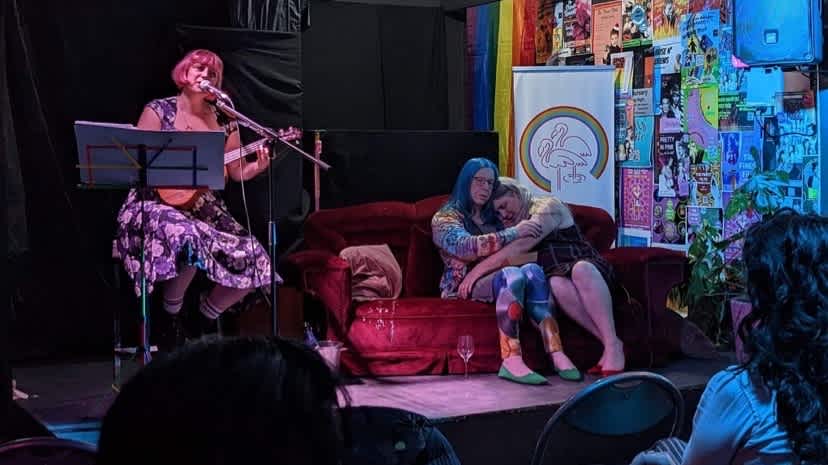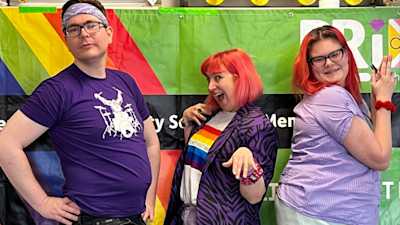Trans Day of Remembrance honours the memory of the trans lives lost.

Image: Two people standing on the street. They are looking at the camera and smiling
“Transgender Day of Remembrance seeks to highlight the losses we face due to anti-transgender bigotry and violence.“ Transgender Day of Remembrance founder Gwendolyn Ann Smith.
Trans Day of Remembrance (TDOR) is observed annually on November 20 and honours the memory of the trans lives lost to acts of transphobia and discrimination.
The following has been put together by two of our Pride Without Barriers Committee Members to encourage all members of our community to better understand why it’s important and how they can show up as strong allies.
Phi Theodoros, Pride Without Barriers Committee Member and Lead Resident Artist – Living Arts
“As a cisgender woman I am unable to truly understand the lived experience of a trans or gender diverse person and the level of both internal and external conflict they may live with daily. But as trans-ally, I can take steps to educate myself, advocate for affirming care/support which can begin with correcting someone if they misgender a client, call out transphobic comments and call others in to help educate them about how and why their actions may be harmful.
"At Life Without Barriers, we know the value of relationships and creating powerful connections with vulnerable people that can ultimately change their lives. An integral part of this is demonstrating that we are a safe person for people to be vulnerable with, to share their experiences and allowing them to be their authentic selves. To be a safe person for someone who is on a journey of gender exploration, or someone experiencing discrimination because of their gender identity is a privilege. However, this is something that with time, education, empathy and courage we can all become.”

Image: Feast Festival show where Phi interviewed Gail and Lisette (the TLLPC) about their transgender experience. Phi is playing an instrument on a stage while Gail and Lisette are cuddled up on the couch.
Brooke McDonald, Co-chair of Pride Without Barriers Committee and Behaviour Support Practitioner
“For me, Transgender Day of Remembrance is an emotional day. I remember the trans leaders who fought for my right to just be here! I remember the trans people who never shared their identity! I remember my trans brothers and sisters who are not here to remember with me! I remember my friend who ended her life! I will always remember that she wasn’t broken, that my brothers and sisters are not broken and that I am not broken. We are not broken! Society is broken!”
Here is a great story of how to support a young person who is navigating their gender identity.
Why do we need Transgender Day of Remembrance and Transgender Awareness Week?
The statistics related to elevated risks of self-harm and suicidal ideation alongside the increased likelihood of maltreatment across education, housing and access to affirming medical care associated with trans people are a shocking reminder of how society still thinks about and treats trans and gender-diverse people.
The Pride Without Barriers Committee encourages every individual to consider how they can take steps towards being a better ally. Even the smallest gesture, like wearing a pride or ally pin and being mindful about using someone's pronouns, can support our trans and gender-diverse clients, colleagues and community members to feel even just a little safer knowing you are by their side.

Image: Two people are lying on top of a transgender flag on the grass
How to demonstrate that you are a safe person
Wear pride or ally pins and learn about the diverse flags that represent different identities within the queer community such as the trans flag, intersex and non-binary flags
Learn and embed inclusive language in your everyday conversations
Share your pronouns before respectfully asking others for theirs, demonstrating the consistent use of someone's pronouns even if these have changed while you have known a person.
Tag part in important LGBTQIA+ days and show your support.
Be mindful of the emotional labour that trans and gender-diverse people may experience when asked to explain their identity or educate others – take responsibility of your own education and learning and respect when someone may not always have the energy to guide you.
Where appropriate, speak up when you hear misinformation and support your trans community members by sharing educational resources with others.
Remember that it may not always be safe for someone to advocate for themselves, use your privilege to engage in conversations and advocate for better treatment and the well-being of trans and gender-diverse people.

Image: Staff dressed in rainbow at a Melbourne office.
Why it is important
Levels of self-harm and suicide are higher in LGBTQIA populations than in non-LGBTQIA populations and even higher in trans populations.
Rates of self-harm and suicidality are extremely high in trans youth. Trans youth are also more likely to have experienced issues with accommodation, including homelessness.
If anything you have read has you feeling upset or distressed, please contact:
QLife – an LGBTQIA+ phone and chat counselling and info service 1800 184 527 | 3pm–12am every day www.qlife.org.au
Suicide Call Back Service 1300 659 467 | 24/7
Non-urgent mental health support is available: Headspace 1800 650 890
The history
It began in 1999 when Transgender advocate Gwendolyn Ann Smith curated a vigil to honour the memory of Rita Hester, a transgender woman who was killed in 1998. This vigil also commemorated the transgender people lost to violence since Rita’s death.
TDOR has now become a day of gathering, togetherness, and community solidarity. A day to remember those we've lost, celebrate our strength in the face of adversity, and commit to fighting transphobia to create a better, safer, and more inclusive world for everyone.
“I am no stranger to the need to fight for our rights, and the right to simply exist is first and foremost. With so many seeking to erase transgender people — sometimes in the most brutal ways possible — it is vitally important that those we lose are remembered, and that we continue to fight for justice.” Gwendolyn Ann Smith.
Transgender Awareness Week and TDOR provide an opportunity for better education around the experiences of and challenges faced by the transgender and gender-diverse community every day.
At Life Without Barriers, we celebrate diversity, and we practice inclusion. We want our employees to be accepted and welcomed for the difference and diversity they bring. This means providing a safe and supportive workplace for everyone, inclusive of culture, ethnicity, faith, age, disability, sexual orientation, gender identity/expression, intersex status, and relationship status. You can learn more about our commitment to a diverse and inclusive workplace here.


